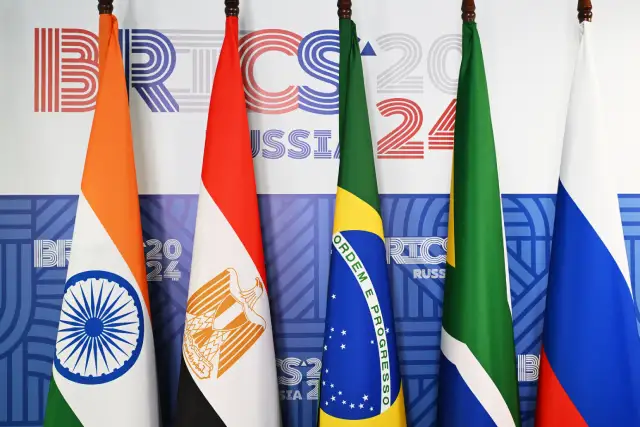The 16th BRICS+ Summit will take place in Russia’s Kazan from October 22nd to 24th. Apart from the founding member states Brazil, Russia, India, China and South Africa, the BRICS Summit 2024 in Kazan marks a significant moment for the bloc, as it will include representatives from newly admitted member states—Egypt, Iran, Ethiopia and the United Arab Emirates.
Among the special guests will be host Russian President Vladimir Putin, Chinese President Xi Jinping, Indian Prime Minister Narendra Modi, Brazilian President Luiz Inácio Lula da Silva, South African President Cyril Ramaphosa and Egypt’s President Abd el-Fattah el-Sisi.
Iran’s newly-elected President Dr Massoud Pezeshkian, Ethiopian Prime Minister Abiy Ahmed and the UAE’s Prime Minister Mohammed bin Rashid Al Maktoum will also join them at the BRICS Summit 2024 in Kazan.
Notably, other heads of state have been invited, including leaders from the Commonwealth of Independent States, a coalition of former Soviet republics.
President Putin has personally extended the invitation to the former Soviet republics’ heads, Russian sources claim. In a further diplomatic move, United Nations (UN) Secretary-General António Guterres is also expected to attend the BRICS Summit 2024 in Kazan.
Mr Guterres’s possibility of joining exemplifies the growing international attention on BRICS+, especially as many see it as an alternative or challenge to the established global governance structures such as the UN.
The current state of the UN has long been criticised by political observers, with many pointing out its inability to address significant global crises effectively. It has also failed to stop large-scale conflicts, violence, unilateral sanctions and provocations by one bloc against another.
The paralysis of the UN’s mechanisms has been attributed to obstruction from the United States, which has veto power within the Security Council.
Among the prominent issues that remain unresolved by the UN are the destruction of Yugoslavia, the invasion of Iraq, and destabilisation across the Middle East, particularly during the Arab Spring.
Along with them, equally concerning are the long-standing humanitarian crises, ranging from famine and lack of education to environmental degradation and access to clean drinking water.
One of the starkest examples of the UN’s limitations is the ongoing embargo of Cuba.
On November 2nd 2023, for the 31st time, the UN General Assembly voted overwhelmingly—187 in favour—to end the US-imposed blockade on the island nation, with only two nations (the US and Israel) opposing the resolution. Yet, despite this repeated global condemnation, the embargo remains in place, a telling sign of the limits of the UN’s influence.
Unilateral sanctions and embargos not only cripple the economies of developing countries but also result in gross violations of the human rights of their people, as they suffer due to the shortage of food and medicines.
With this reality, BRICS has emerged as a platform advocating for a more multipolar world order, where one power will not rule over the entire planet along with its vassals.
While the US continues to exert considerable economic and military influence, BRICS seeks to offer a different pathway—one not in direct confrontation with the US-led collective West but operating independently of it.
This approach has gained substantial traction, especially in Asia, Africa and Latin America, where countries are increasingly seeking alternatives to the systems designed by the West.
The timing of the BRICS Summit is significant, as the world is grappling with major geopolitical challenges, including the ongoing conflict in the Middle East.
All BRICS members and their potential future partners have shared concerns over the Israeli bombing of Gaza and Lebanon.
The group’s collective stance is that these actions violate international law and moral principles.
Importantly, they believe that the US bears responsibility for supporting Israel’s military actions against the civilians in Gaza and Lebanon, with Washington’s backing enabling continued massacres.
Without US military aid, it is argued by experts worldwide that Israel would be compelled to negotiate, just as it did during previous peace talks over Sinai, Gaza, and southern Lebanon.
Beyond geopolitics, the summit will also focus on economic cooperation.
The global economy has been severely disrupted by sanctions, particularly those imposed by the G7 on Russia. Within the BRICS framework, there have been efforts to develop a decentralised international payment system to reduce the impact of such sanctions.
This was proposed in June at the Tashkent forum by the BRICS Business Council. The goal is to create a system where no single participant can restrict others, a necessity in light of Russia’s experience with asset freezes and sanctions.
Nuclear security is another critical issue that will likely feature prominently in discussions.
BRICS unites three nuclear-armed nations: Russia, China and India.
Their approach to nuclear weapons stands in stark contrast to that of the US, France and the UK.
While the latter have conducted nuclear tests outside their own borders, BRICS members have adhered to a more cautious approach.
South Africa, for instance, remains the only country in the world to have voluntarily dismantled its nuclear arsenal in 1989.
Meanwhile, the US remains the only country to have used nuclear weapons in conflict, and its nuclear doctrine continues to entertain the possibility of a pre-emptive strike.
Given these dynamics, the BRICS Summit 2024 in Kazan will be a critical moment to assess the group’s position on global security and its growing role in international governance.
With 30 additional countries—including Indonesia, Vietnam, Kazakhstan and Algeria—expressing interest in joining, BRICS is gaining ground both in terms of geopolitical influence and economic power.
The combined GDP of BRICS nations now surpasses that of the G7, and their rate of economic growth is far higher.
As the summit convenes in Kazan, the BRICS+ bloc will aim to strengthen its collective stance on key global issues, positioning itself as a major force advocating for a fairer, multipolar world order.
Whether in terms of economic integration or political cooperation, the influence of BRICS continues to expand, offering an alternative vision to the West-led international system.

